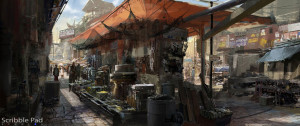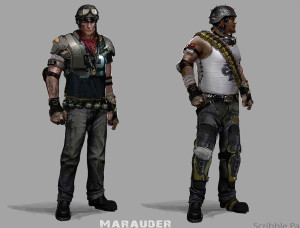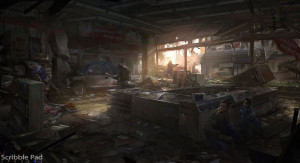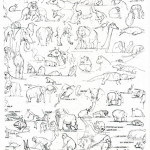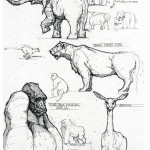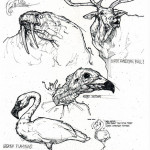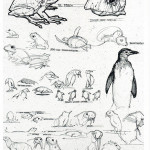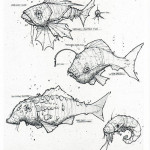JAMES PAICK IS THE FOUNDER AND CREATIVE DIRECTOR AT SCRIBBLE PAD STUDIOS WITH OVER 15 YEARS OF DESIGN EXPERIENCE.
Scribble Pad Studios under the direction of James Paick has been responsible for creating some of the most memorable designs and moments in entertainment design. James has developed many projects within the gaming, film, theme park, illustration, entertainment space and advertising fields.
Websites:
www.BrainstormSchool.com – This is a school specifically focused on design & job placement for students in the video game industry.
James Paick/ Scribble Pad Studios’ current portfolio examples
In this first part of the interview, we asked James Paick specific questions about what it’s like to be a concept artist in the entertainment industry, dispel a few common misconceptions that aspiring artists tend to have about the field, and discuss his educational background. Here’s what he had to say:
AT WHAT AGE DID YOU COMMIT TO BECOMING A PROFESSIONAL ARTIST? WHAT WERE YOUR MOTIVATIONS/ INSPIRATIONS?
I think I’ve always been into art as a child. There was no real outlet creatively at that time for art to be respected in the way it is today. Once concept art was exposed to me while at Art Center, there was no turning back. It was balls to the walls.
WHAT DO YOU LIKE MOST ABOUT YOUR JOB? WHAT DO YOU FEEL ARE THE BIGGEST CHALLENGES?
Each project has its own challenges, but the one thing that makes it absolutely fun is you’re allowed to do things your way. And that’s what really makes project better; when you can bring in your soul and your ideas to life.
ARE THERE ANY MISCONCEPTIONS YOU THINK STUDENTS TEND TO HAVE ABOUT CONCEPT ART AND ILLUSTRATION, THE JOB AND/ OR THE CAREER THAT YOU WISH TO SET STRAIGHT?
Yes!!! This is a field that is fun, exciting, & you get to ‘be a kid’ for the rest of your life. However, this is also a field that is very competitive, takes dedication, & people with a true passion for art & design will really flourish in this industry.
CAN YOU SHARE A PERSONAL STORY, ABOUT A HARD LESSON THAT YOU LEARNED (ON THE BUSINESS OR ARTISTIC SIDE OF THINGS), THAT COULD HAVE BEEN AVOIDED, HAD YOU BEEN BETTER INFORMED?
I would love to tell this story about my experience when I was told I was color blind as a student. This was really shocking for me, because it filled me with a lot of self-doubt for pursing this career. As one of the most discouraging points in my life as a student, it really helped me learn and taught me exactly what I needed to focus on to become a better artist. It also taught me that I should never give up, no matter the consequence. Art is a journey that will have hurdles & the occasional speed bumps, but those are going to be there no matter what, and the artist must really have the confidence to conquer any of these challenges that come their way.
James Paick Student work examples
WERE YOU DISCIPLINED AND/OR FOCUSED IN SCHOOL? WHAT WAS YOUR ROUTINE? HOW MUCH TIME DID YOU SPEND ON YOUR HOMEWORK VS. SOCIALIZING?
I would like to think that I was very disciplined during my education. I followed the advice from an instructor, which was:
Get whatever assignment done, on the day it was assigned. How did I do it? I made sure not to stop until the assignment was done.
I did socialize a bit, but I made sure to try & focus on that during break, because I knew I would always have time to socialize during that time.
BESIDES THE FUNDAMENTAL ART CLASSES (PERSPECTIVE, ANATOMY, COLOR THEORY, ETC.), WHAT CLASSES DO YOU THINK STUDENTS SHOULD TAKE IN COLLEGE? ARE THERE ANY CLASSES YOU TOOK WHICH SURPRISINGLY HELPED YOU MORE THAN YOU THOUGHT THEY WOULD?
Sketching classes were always great to understand how to duplicate things, but there was a particular class where we had to go out in nature or to museums and sketch what we saw. The real magic happened when our assignment was to take what we observed and redesign & create something unique using our newly obtained knowledge.
DID YOU HAVE ANY OUTSIDE HELP PUSHING YOU ALONG WITH YOUR TRAINING? FROM A MENTOR, PASSIONATE TEACHER? FAMILY? FELLOW STUDENT?
Fellow students were the main source of encouragement & discipline. We did not allow ourselves to slack off because we knew how important this was to our dreams. Very similar to having a work-out partner with you while you exercise & at all times.
DID YOU STUDY OR TAKE ADDITIONAL CLASSES/ LESSONS, OUTSIDE OF SCHOOL? IF SO, HOW FREQUENTLY?
I would set up small sketch groups with classmates during break, and create projects that we could design together. We would meet once a week, submit work, & critique ourselves in order to essentially ‘create our own class’, in order to further push the learning from our previous term in school.
This concludes part 1 of our interview. In part two, we discuss with James Paick his Dos and DONTs of portfolio building, How he branded and marketed himself in the beginning, and much more. Head on over to continue reading.
All images used with permission by the artist. ©James Paick

